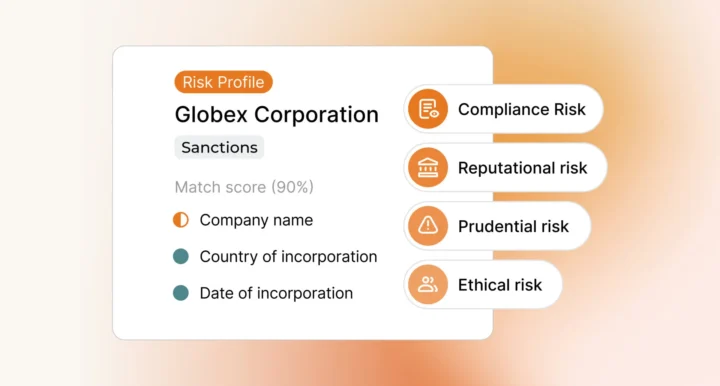When money launderers disguise their identities behind corporate infrastructure or foreign shell companies, it falls to compliance teams to uncover the true criminal risk by running ultimate beneficial ownership (UBO) checks. Misuse of shell companies and corporate structures is a significant global threat, costing economies hundreds of millions of dollars in lost income per year, while enabling corruption and criminal activities around the world.
Given the scale of the threat, intergovernmental money laundering watchdog, the Financial Action Task Force (FATF), includes a requirement for UBO checks as part of its 40 Recommendations – meaning that firms must consider UBO as part of their AML/CFT compliance solution. However, in a shifting risk landscape, in which criminals continuously develop new techniques to hide illegal funds, AML/CFT regulations must evolve to keep pace and, in 2023, the FATF updated its UBO guidance to reflect new challenges.
With that in mind, we’re exploring the FATF’s UBO updates, along with some of their key compliance challenges.
How has the FATF UBO guidance changed?
Following a 2022 commitment to “preventing the misuse of legal persons”, the FATF strengthened its UBO guidance during its February 2023 Plenary in Paris. The update specifically affected Recommendation 24, Guidance on Beneficial Ownership of Legal Persons, with the goal of ensuring that “competent authorities have access to adequate, accurate and up-to-date information on the true owners of companies” and that criminals, corrupt officials and sanctions targets cannot use shell companies “to hide their dirty money and illicit activities”.
The FATF made 3 key updates to its UBO guidance:
Multi-Pronged Approach
The FATF requires members to take a “multi-pronged approach” to establishing beneficial ownership that incorporates “several sources of information”. At its core, the multi-pronged approach refers to UBO information obtained by companies as part of customer due diligence (CDD), and to UBO information held by public authorities on a registry (or “alternative mechanism”) that can be accessed rapidly and efficiently.
Under the multi-pronged approach, the FATF emphasises the importance of public and private entities being able to “access and exchange information on beneficial ownership”, and using that capability to “inform the national understanding of current and emerging risks.”
UBO Verification
The FATF clarified its guidance on the verification of UBO data in order to ensure its accuracy. The updated guidance made clear that UBO information verification must be risk-based and could include the following measures:
- A review of documents such as share certificates, shareholder registers, and board meeting resolutions.
- Manual or automated cross checks with government databases, including population registers, taxpayer registers, and vehicle and land registries.
The verification process must prove that a natural person “actually exists and is who they claim to be”. In practice, this means conducting a review of government-issued documents and verifying a “combination of attributes” such as name, birth date, and nationality. In establishing that a person is a beneficial owner, firms should consider:
- Whether the person has ownership of or voting rights in the entity they control.
- Whether the person is actually exercising their control rights over the entity – or is taking instruction from a third party.
- Whether the beneficial owner is consistent with the “structure and risk profile” of the entity.
Foreign Company Ownership
The FATF also clarified that its UBO standards should extend beyond a country’s borders, to foreign-created businesses “with sufficient links with their country”. The updated guidance states that beneficial ownership information about foreign-created businesses should be “timely”, “adequate”, and “up to date”. The 2023 update also sets out stronger controls to “prevent the misuse of bearer shares and nominee arrangements”.
UBO Challenges in 2023
While FATF guidance calls for governments to establish public beneficial ownership registers, some countries have encountered legal friction in implementing that specific measure.
The European Union: In the EU, the Fifth Anti-Money Laundering Directive (5AMLD) set out requirements for public beneficial ownership registries – a regulation which came into effect in January 2020. However, upon discovering that they had been added to the beneficial ownership registry in Luxembourg, several politically exposed persons (PEP) requested that their names be removed.
After that request was denied in Luxembourg, the PEPs launched a legal bid, citing factors such as privacy and security risks. Ultimately, the EU Court of Justice upheld the legal bid – a decision which overrode 5AMLD and meant that many EU member states either restricted public access to their UBO registers, or suspended the registers entirely. AML/CFT experts have pointed out that the decision had significantly reduced AML/CFT transparency, and made it easier for criminals to use corporate infrastructure to conceal illegal activities.
South Africa: In February 2023, South Africa was added to the FATF Grey List for failing to meet AML/CFT standards set out in the Recommendations. In its action plan for South Africa, the FATF set out a requirement that the South African government implement a UBO register in domestic legislation by the end of January 2025.
Accordingly, South Africa’s Companies and Intellectual Property Commission (CIPC) is working urgently to implement amendments to current AML/CFT laws in order to bring the country into compliance with FATF standards. CIPC Commissioner Rory Voller has indicated that South Africa’s UBO register will be launched after amendments to the General Laws (Anti-Money Laundering and Combating Terrorism Financing) Amendment Act 22 of 2022 are passed.
Address UBO Challenges with Next Generation Technology
The FATF’s 2023 update has made UBO compliance a priority for regulators around the world – and particularly in jurisdictions where legal challenges are taking valuable customer data offline. Where UBO verification has become more difficult – as a result of legal challenges or a lack of available information – firms will need to work harder to establish and verify the identities of their customers by gathering as much identifying data as possible.
One of the best sources of information on beneficial ownership is negative news or adverse media, where breaking stories frequently reveal customer connections to corporate entities, including shell companies before that information is confirmed by official sources. Both the Panama Papers (2016) and the subsequent FINCEN Files (2020) featured revelations about shell company misuse, and exposed illicit financial activity in low-regulation jurisdictions around the world – triggering numerous AML/CFT investigations and leading to the recovery of over $500 million in lost revenue.
To capture adverse media data relevant to UBO verification, firms must implement a technology solution capable of sourcing data from around the world, while minimising false positives and noise by extracting only the most relevant information. Powered by next generation machine learning technology, Ripjar’s Labyrinth Screening platform delivers that capability, enabling firms to search for customer names across thousands of global media sources in real time, in over 20 foreign languages. Generating actionable financial intelligence in seconds, Labyrinth searches ensure your firm has the latest risk data at its fingertips, and can use that data to make faster, stronger decisions about UBO and other critical AML/CFT issues.
Contact us to discuss how Ripjar can help you comply with the latest FATF UBO guidance
Last updated: 31 January 2025





